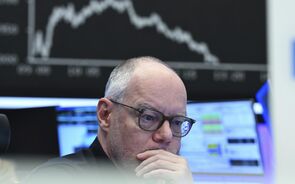Cramer: "Bernanke's Bull Market"
5 mensagens
|Página 1 de 1
What the Fed did and why: supporting the recovery and sustai
By Ben S. Bernanke
Thursday, November 4, 2010;
Two years have passed since the worst financial crisis since the 1930s dealt a body blow to the world economy. Working with policymakers at home and abroad, the Federal Reserve responded with strong and creative measures to help stabilize the financial system and the economy. Among the Fed's responses was a dramatic easing of monetary policy - reducing short-term interest rates nearly to zero. The Fed also purchased more than a trillion dollars' worth of Treasury securities and U.S.-backed mortgage-related securities, which helped reduce longer-term interest rates, such as those for mortgages and corporate bonds. These steps helped end the economic free fall and set the stage for a resumption of economic growth in mid-2009.
Continuação aqui: http://www.washingtonpost.com/wp-dyn/co ... 72_pf.html
Remember the Golden Rule: Those who have the gold make the rules.
***
"A soberania e o respeito de Portugal impõem que neste lugar se erga um Forte, e isso é obra e serviço dos homens de El-Rei nosso senhor e, como tal, por mais duro, por mais difícil e por mais trabalhoso que isso dê, (...) é serviço de Portugal. E tem que se cumprir."
***
"A soberania e o respeito de Portugal impõem que neste lugar se erga um Forte, e isso é obra e serviço dos homens de El-Rei nosso senhor e, como tal, por mais duro, por mais difícil e por mais trabalhoso que isso dê, (...) é serviço de Portugal. E tem que se cumprir."
Bernanke, Bernanke... Ele é das pessoas que pensa que tudo na economia se resolve com políticas monetárias, mas para sua surpresa a injecção de dinheiro e as baixas taxas de juro não pararam esta depressão económica. Ele pode pode pôr o mercado accionista a subir, pode melhorar o "wealth effect" e até pode incentivar a economia, mas está a fazê-lo à custa de dívida pública e privada cada vez maior. Pelo menos é bom saber que finalmente estão a reconhecer que os EUA se podem tornar no novo Japão, é pena é não perceberem que estas medidas não fazem aumentar a produtividade da economia, simplesmente aumentam o consumo e o "wealth effect", factores que fazem crescer a economia no curto-prazo. Sabe-se perfeitamente que o que faz a economia crescer a longo prazo é investimento em capital (fábricas, etc...), e isso simplesmente não está a acontecer nos EUA. Também é interessante ver o Jim Cramer a dizer que precisamos de consumo, cá para mim poupança é o que precisamos... Como isto vai acabar já toda a gente sabe, uma bolha especulativa. Será no stock market, no real estate? Entretanto é capaz de haver um credit crunch. É esperar para ver...
O Jim Cramer pode ser muito bom especulador, mas de economia ele não percebe nada. É isso, criem lá o wealth effect e estimulem o consumo incentivando a dívida, realmente foi isso que fez crescer a economia nos últimos anos, depois acabámos foi nesta depressão económica. Até estes paspalhos perceberem que o paradigma neoclássico da macroeconomia é falso, vamos continuar nisto... Não culpo estes ignorantes, quem estuda macroeconomia teve de aceitar isto como verdade, mas enfim...
Só uma citação do Ben Bernanke, quase no topo da bolha no real estate:
"a um nível nacional este aumento de preços reflectem fortes fundamentais económicos, incluindo um crescimento robusto no nº de empregos e salários"
O que aconteceu a seguir já se sabe. Será que os fundamentais económicos pioraram de um momento para o outro?
O Jim Cramer pode ser muito bom especulador, mas de economia ele não percebe nada. É isso, criem lá o wealth effect e estimulem o consumo incentivando a dívida, realmente foi isso que fez crescer a economia nos últimos anos, depois acabámos foi nesta depressão económica. Até estes paspalhos perceberem que o paradigma neoclássico da macroeconomia é falso, vamos continuar nisto... Não culpo estes ignorantes, quem estuda macroeconomia teve de aceitar isto como verdade, mas enfim...
Só uma citação do Ben Bernanke, quase no topo da bolha no real estate:
"a um nível nacional este aumento de preços reflectem fortes fundamentais económicos, incluindo um crescimento robusto no nº de empregos e salários"
O que aconteceu a seguir já se sabe. Será que os fundamentais económicos pioraram de um momento para o outro?
First rule of central banking: When the ship starts to sink, central bankers must bail like hell.
Cramer: "Bernanke's Bull Market"
"Bernanke's Bull Market"
By Jim Cramer
RealMoney Columnist
11/2/2010 11:02 AM EDT
"Does Fed chief Ben Bernanke play the stock market? Does he, unlike our president, get that stocks are an important repository of savings, with trillions locked up in 401(k)s and IRAs? Does he get what moves stocks, and is he simply abetting it in some sort of brilliant-mad-scientist way?
I have been thinking long and hard about this idea during this run here, knowing that his predecessor understood the interplay between stocks and his policies and used them to great advantage. Anyone who remembers the October 1998 intervention by Greenspan -- calling an emergency rate cut meeting five days after suggesting rates should stay the same or climb -- recognizes that Greenspan was the master of moving stocks.
There is one difference, though -- this time it's life or death. Greenspan wanted a healthy stock market. We didn't have one in 1998 because of Long Term Capital, the failed hedge fund that threatened to wipe out the financial system. Greenspan's move in 1998 gave us the most bountiful September and October in ages -- so big that they skew the post-election numbers and make them look better than they are. (We should be aware of that effect when we look at how well stocks have done after midterm elections.)
Bernanke, on the other hand, needs one of the pieces of the average consumer's wealth to go higher. He can't boost the worth of your house, no matter how hard he tries -- and he has tried. That's all caught up in the overbuild and the foreclosure mess. HE can't give you a wage or create jobs -- again, although he has tried with rates so low that they should have triggered hiring, as they did around the globe. I think Washington's uncertainty and the consumer retrenchment have blunted his efforts.
But the stock market? What does the stock market want? It wants higher commodity prices, which he can give us by flooding the world with dollars that will then cause oil and copper to run, which he must know we key off of. We see that at work every day. How many people are taking their cue on the market from the iPath Copper (JJC - commentary - Trade Now), the copper ETN. How many are taking their cue from the oil futures, which are, in part, about the refuge from the dollar? Bernanke knows that earnings are going to propel stocks higher, and he can control the overseas component by making us more competitive simply by debasing the dollar.
I know it seems attenuated but, trust me, unlike the media and the short-sellers, he knows for certain that people will buy the stocks of companies that are reporting better earnings. And he can keep those earnings going higher by keeping the dollar from going higher or even sending it lower vs. our major trading partners. Believe me when I say that Bernanke is looking at these earnings reports and recognizing the success of in allowing indebted companies to refinance, in allowing U.S. companies to make more money and take share internationally and by creating profits that can be dividended back to shareholders, making stocks all the more attractive.
Bernanke can also keep rates so low that CDs and savings accounts are just stupid places to keep your money. He can make it so Treasuries give you no returns whatsoever. He can do this even if we raise taxes on the wealthy and their savings, because he knows that the repository of wealth is in tax-free instruments for retirement and college, and therefore it is a pure-return issue -- not an issue about variable tax rates. He is encouraging dividend boosts because people get them tax-free and reinvest in them.
Why do this? Because the wealth effect is so important to his thinking. He knows that if people feel more confident -- something he can do by affecting the animal spirits of the market -- they will spend ... and we need spending so that we don't become Japan.
I have read so much lately about Japan and how we might be on a Japanese course. What those articles miss -- endlessly miss -- is that the Japanese citizenry was all in the stock market at the time of the crash. They were in at 38,000 on the now-9000 Nikkei, and it's been down there forever. People forget that we were at 5000 on the Dow when they were at 38,000 on the Nikkei. It was that crash, NOT the real estate crash, that really wiped out peoples' savings.
Bernanke knows this.
He knows that they key to stopping the Japanization is twofold: Get money off the sidelines into stocks, both growth and high-yield, and get the stock market up so people will spend. I ask all of the retail CEOs what drives sales, and they almost all come back and say the feeling that people's homes or their portfolios are going higher. Again, Bernanke has failed with the former (although I think he will ultimately succeed -- if you look at the aggregate numbers, home prices have been bumping along the bottom for a year now).
He is not going to fail with the stock market.
Remember, Bernanke has studied the Dow more than you and I. He has studied the Nikkei more than you and I. He knows it. He knows the key lever, the lever that affects 90 million Americans: the stock market.
We are always quick to try to relate Bernanke's efforts to creating jobs and to stabilizing housing. I am telling you that we aren't thinking about this right. He's creating a put, he's telling you to buy the call, and he is creating wealth DESPITE OBAMA AND CONGRESS' seemingly best attempts to destroy it.
He is succeeding. He will stop the Japanization of this economy through his stock market efforts.
It is just a wonder that nobody's calling this the Bernanke Bull Market. Because that's precisely what it is.
At the time of publication, Cramer had no positions in the stocks mentioned. "
(in www.realmoney.com)
By Jim Cramer
RealMoney Columnist
11/2/2010 11:02 AM EDT
"Does Fed chief Ben Bernanke play the stock market? Does he, unlike our president, get that stocks are an important repository of savings, with trillions locked up in 401(k)s and IRAs? Does he get what moves stocks, and is he simply abetting it in some sort of brilliant-mad-scientist way?
I have been thinking long and hard about this idea during this run here, knowing that his predecessor understood the interplay between stocks and his policies and used them to great advantage. Anyone who remembers the October 1998 intervention by Greenspan -- calling an emergency rate cut meeting five days after suggesting rates should stay the same or climb -- recognizes that Greenspan was the master of moving stocks.
There is one difference, though -- this time it's life or death. Greenspan wanted a healthy stock market. We didn't have one in 1998 because of Long Term Capital, the failed hedge fund that threatened to wipe out the financial system. Greenspan's move in 1998 gave us the most bountiful September and October in ages -- so big that they skew the post-election numbers and make them look better than they are. (We should be aware of that effect when we look at how well stocks have done after midterm elections.)
Bernanke, on the other hand, needs one of the pieces of the average consumer's wealth to go higher. He can't boost the worth of your house, no matter how hard he tries -- and he has tried. That's all caught up in the overbuild and the foreclosure mess. HE can't give you a wage or create jobs -- again, although he has tried with rates so low that they should have triggered hiring, as they did around the globe. I think Washington's uncertainty and the consumer retrenchment have blunted his efforts.
But the stock market? What does the stock market want? It wants higher commodity prices, which he can give us by flooding the world with dollars that will then cause oil and copper to run, which he must know we key off of. We see that at work every day. How many people are taking their cue on the market from the iPath Copper (JJC - commentary - Trade Now), the copper ETN. How many are taking their cue from the oil futures, which are, in part, about the refuge from the dollar? Bernanke knows that earnings are going to propel stocks higher, and he can control the overseas component by making us more competitive simply by debasing the dollar.
I know it seems attenuated but, trust me, unlike the media and the short-sellers, he knows for certain that people will buy the stocks of companies that are reporting better earnings. And he can keep those earnings going higher by keeping the dollar from going higher or even sending it lower vs. our major trading partners. Believe me when I say that Bernanke is looking at these earnings reports and recognizing the success of in allowing indebted companies to refinance, in allowing U.S. companies to make more money and take share internationally and by creating profits that can be dividended back to shareholders, making stocks all the more attractive.
Bernanke can also keep rates so low that CDs and savings accounts are just stupid places to keep your money. He can make it so Treasuries give you no returns whatsoever. He can do this even if we raise taxes on the wealthy and their savings, because he knows that the repository of wealth is in tax-free instruments for retirement and college, and therefore it is a pure-return issue -- not an issue about variable tax rates. He is encouraging dividend boosts because people get them tax-free and reinvest in them.
Why do this? Because the wealth effect is so important to his thinking. He knows that if people feel more confident -- something he can do by affecting the animal spirits of the market -- they will spend ... and we need spending so that we don't become Japan.
I have read so much lately about Japan and how we might be on a Japanese course. What those articles miss -- endlessly miss -- is that the Japanese citizenry was all in the stock market at the time of the crash. They were in at 38,000 on the now-9000 Nikkei, and it's been down there forever. People forget that we were at 5000 on the Dow when they were at 38,000 on the Nikkei. It was that crash, NOT the real estate crash, that really wiped out peoples' savings.
Bernanke knows this.
He knows that they key to stopping the Japanization is twofold: Get money off the sidelines into stocks, both growth and high-yield, and get the stock market up so people will spend. I ask all of the retail CEOs what drives sales, and they almost all come back and say the feeling that people's homes or their portfolios are going higher. Again, Bernanke has failed with the former (although I think he will ultimately succeed -- if you look at the aggregate numbers, home prices have been bumping along the bottom for a year now).
He is not going to fail with the stock market.
Remember, Bernanke has studied the Dow more than you and I. He has studied the Nikkei more than you and I. He knows it. He knows the key lever, the lever that affects 90 million Americans: the stock market.
We are always quick to try to relate Bernanke's efforts to creating jobs and to stabilizing housing. I am telling you that we aren't thinking about this right. He's creating a put, he's telling you to buy the call, and he is creating wealth DESPITE OBAMA AND CONGRESS' seemingly best attempts to destroy it.
He is succeeding. He will stop the Japanization of this economy through his stock market efforts.
It is just a wonder that nobody's calling this the Bernanke Bull Market. Because that's precisely what it is.
At the time of publication, Cramer had no positions in the stocks mentioned. "
(in www.realmoney.com)
5 mensagens
|Página 1 de 1
Quem está ligado:
Utilizadores a ver este Fórum: GaussSLB47, Google [Bot], Goya777, iniciado1, Investor Tuga, latbal, m-m, malakas, Manchini888, marketisnotefficient, Mr.Warrior, MR32, nbms2012, nov, Nuno V, nunorpsilva, OCTAMA, Olhar Leonino, PAULOJOAO, Purificaçao, Simplório, StockRider!, yggy e 102 visitantes



